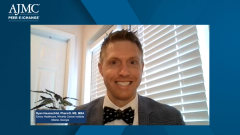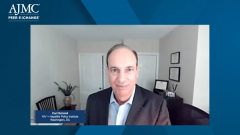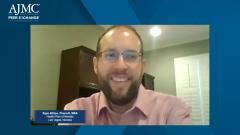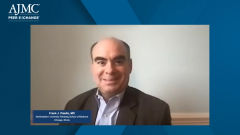
Unmet Needs for HIV PrEP Therapy
Carl Schmid and Frank J. Palella, MD, review unmet needs for the uptake of HIV PrEP therapy for at-risk patient populations.
Episodes in this series

Ryan Haumschild, PharmD, MS, MBA: Carl, which groups of eligible patients are more likely to see PrEP [pre-exposure prophylaxis] therapy in your experience? We’ve heard Frank and Ryan mention one of the drivers of utilization, expansion of use, but who are those groups that are more likely to receive PrEP, and then which are the ones that are less likely to receive PrEP therapy? Thinking about social determinants of health inclusion, equity, and diversity, maybe include that as we talk about this expansion of use.
Carl Schmid: Sure. The CDC [Centers for Disease Control and Prevention] did an analysis a couple of years ago, and they said there are around 1.2 million people that are probably eligible for PrEP. Maybe that number has grown, but based on that number, they look at PrEP usage right now. As Ryan talked about earlier, for White men it’s higher; 61% of those eligible are on it. Now, we want 100%, so it still can grow. But where we’re seeing lack of PrEP uptake is among Hispanics; they’re only at 14.6% of those who are eligible. And much, much lower are Blacks and African Americans, only 8.4%. It’s also very low for women, only 9.6% of those who are eligible for PrEP are taking it. Looking at age groups, below 24, it’s only around 14%. We need to increase PrEP uptake. If you look at geographic areas as well, you look at New York state, it’s over 40% of those eligible. But if you look at Alabama, it’s only like 16% or 17%.
There’s a lack of education. There’s a lot of stigma still associated. People don’t have access to health care, particularly in the southern states, lack of Medicaid expansion, so there’s a lot of work to do.
Ryan Haumschild, PharmD, MS, MBA: It’s interesting you bring it up because we’re starting to expand the education, policies to create access to these medications. But how many people are still underserved who just don’t understand that it’s out there, the effectiveness of it? Or they’re saying, “Hey, I’m a young male. I feel like I’m healthy. Why would I need to take a medication every day and stay compliant with it?” Are you seeing some of that too, as you talked about some of the demographic information? Is that also a driver of maybe why there are some barriers to therapy?
Carl Schmid: Yes, exactly what you said. Why would someone want to take a medication, “if I’m not sick? I feel great.” They don’t always realize that they’re at risk for HIV, so that’s our work to do, is to educate people. Particularly in the South, Black gay men, Latino gay men, but also Black women, really need to be educated as well, and also their providers.
Ryan Haumschild, PharmD, MS, MBA: Well, that’s another thing. I want to jump into something else, but I’m curious, how many times are providers receiving enough education in this space? Because we have so many patients who are being seen in primary care clinics, where maybe someone’s undiagnosed, and how thoughtful are we being about reviewing some of those risk factors, asking some of these questions and screening processes to make sure we’re being more proactive? And are we making sure that we identify the individuals who are most appropriate for therapy, providing effective education? Carl, that’s one thing that really stood out to me about what you said, if people don’t know or we’re not providing them education, or they’re concerned that they’re healthy and there’s nothing else to add on, then maybe they’re not going to see the need to follow up on it because we think about adherence and taking things, it is important. Compliance is an important piece of PrEP therapy, but if people don’t receive the right education around it, if they don’t have the right adherence or understand the importance of it, they’re going to skirt by it, and even if they know about it, not take it. I don’t know if anyone else has seen that within their practice. Frank, I know you practice actively, are you seeing some of this, and is this an unmet need as we start to look forward in expanding PrEP use?
Frank J. Palella, MD: Absolutely. Awareness is the first step in accepting and adopting PrEP usage. Awareness is the issue for so many of the as yet untreated, or nonprophylaxed so to speak, persons who are eligible for PrEP. This is particularly true among young MSMs [men who have sex with men], as well as young women who would be eligible living in a higher prevalence area. This also tends to demographically, strongly disproportionately influence people of color. I’ll comment again on this whole syndrome of youth being a deterrent to adoption of preventive health practices. As opposed to being responsive to a diagnosis, the diagnosis here is risk. The diagnosis is risk for HIV, and taking daily medication of any kind requires stepping through a psychological portal of self-acknowledgment that such risk exists.
The uptake of PrEP among young individuals has been likened to juvenile-onset diabetics who feel great and can’t believe that anything could threaten them, nor the need for say, daily insulin therapy. The added challenge here is it is very difficult for anyone, let alone youthful people, to think about something so pleasurably acquired as through sex, possibly posing a risk to them. “How could sex be bad for me, or how could sex be a risk?” The strategy of positively depicting PrEP as a step that will enhance the safety and enjoyment of sex without concern has been one that has been taken up in many cities, including New York City’s department of public health.
Ryan Haumschild, PharmD, MS, MBA: Frank, a question for you then is, PrEP has been kind of revolutionary in the benefits it provides. But do you still see an unmet need, and is that unmet need more around that education and identifying people, or do you feel like PrEP is the answer? How does PrEP fit into the unmet needs still within this space?
Frank J. Palella, MD: PrEP is one part of overall STD [sexually transmitted disease] prevention, which requires, likable again, to the clinical cascade of care we’ve adopted with HIV. Testing, referral for therapy, starting on a drug, in the case of HIV, getting the viral load undetectable, and then retention and care. In the case of PrEP, it’s identification of risk, testing, and ensuring someone is HIV uninfected because that’s the sine qua non for the initiation of PrEP, starting the drug, then having people follow up. In the ideal periodicity, a follow-up is every 3 months, at which time screening for syphilis, gonorrhea, chlamydia, and when appropriate other STDs like viral hepatitis, herpes, warts, takes place as well.
PrEP is an important facet of an overall strategy of STD prevention. It needs to be looked at not as merely the provision of a prescription for a daily pill that can prevent HIV, but one of the first steps in the establishment of a relationship to maintain an individual as HIV-free and STD-free. It includes counseling, the provision of condoms, a health care environment in which people feel comfortable disclosing the most intimate details of their lives. And this requires providers to feel comfortable talking about this facile in the language surrounding PrEP, facile in the monitoring that needs to take place when people are initiated on PrEP, and availability to answer questions, and to be a confidant.
Ryan Haumschild, PharmD, MS, MBA: I love your passion. Obviously, you’re very passionate about it, and I like your holistic approach, where PrEP is probably a key factor in ending this epidemic initiative. But like you said, there’s other testing, other education, and other safe sex practices that we must incorporate along with PrEP therapy to be truly successful. You did a great job summarizing that. I know a lot of our payers and providers are looking at this, and they’re going to think to themselves, what can we do as part of a comprehensive approach? Realizing that PrEP alone is great, but it comes with education and a lot of these supportive wraparound services that are individualized for each one of these patients. So, really great context there. I appreciate that.
Transcript Edited for Clarity
Newsletter
Stay ahead of policy, cost, and value—subscribe to AJMC for expert insights at the intersection of clinical care and health economics.









